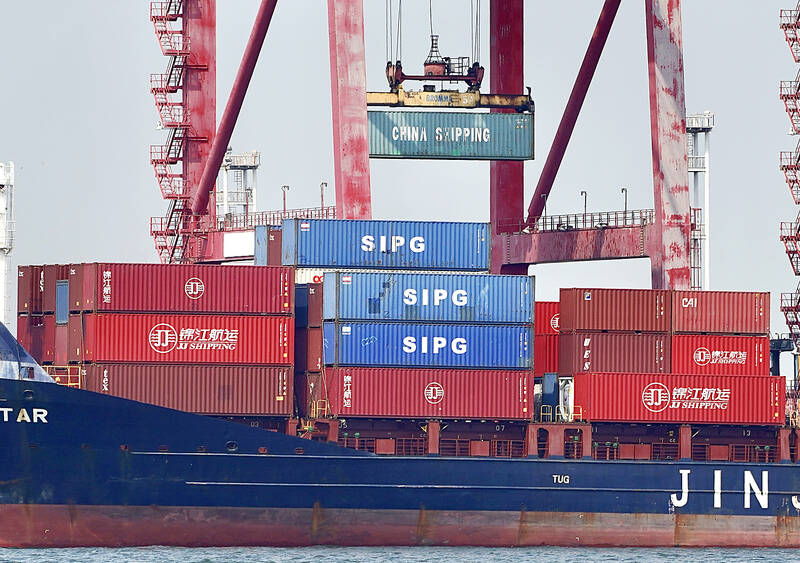Export orders last month contracted by a slower-than-expected 3 percent year-on-year as demand for artificial intelligence (AI) and high-performance computing (HPC) applications helped absorb a seasonal slowdown, the Ministry of Economic Affairs said yesterday.
Orders last month slid to US$46.97 billion from US$48.42 billion in January last year. The ministry had predicted orders would shrink at least 4 percent from a year earlier.
On a monthly basis, orders fell 11.2 percent from US$46.97 billion, ministry data showed.

Photo: CNA
“As strong AI and HPC applications continued to drive demand for electronics orders last month on an annual basis, the AI boom is not cooling down,” Department of Statistics Director Huang Yu-ling (黃于玲) said.
In addition, the ministry’s survey found that fewer firms were requested to ship goods ahead of schedule last month compared with the previous month as their customers seemed to be less worried about upcoming US tariffs, Huang said.
Export orders this month are expected to return to annual growth of between 15.3 percent and 20.6 percent to between US$43.5 billion and US$45.5 billion, the ministry said.
“We still expect an uptrend in the short term, though there are multiple uncertainties ahead in terms of geopolitical risks,” Huang said. “Export orders in January and February combined are expected to show year-on-year growth of between 5 and 7.3 percent.
Orders for electronic products last year increased 1.5 percent year-on-year to US$17.71 billion due to strong AI and HPC demand, despite declines in orders for chip designers and substrates, while orders for information and communications technology products dipped 13.3 percent to US$12.06 billion as demand for mobile phones and laptops dropped over the Lunar New Year holiday, the ministry said.
Orders for optoelectronic products edged 0.3 percent lower to US$1.58 billion last month, due to slower seasonal demand for back-light modules and camera lenses, the ministry said.
Orders for base metals plunged 21.7 percent to US$1.78 billion because of weak steel demand and price competition, while orders for machinery products and mechanical equipment dropped 4.7 percent to US$1.53 billion on sagging automation demand, it said.
Orders for plastic and rubber products sank 20.5 percent to US$1.32 billion as customers preordered ahead of the Lunar New Year holiday, while orders for chemical products contracted 19 percent to US$1.22 billion due to intensifying competition from global peers, the ministry said.

Anna Bhobho, a 31-year-old housewife from rural Zimbabwe, was once a silent observer in her home, excluded from financial and family decisionmaking in the deeply patriarchal society. Today, she is a driver of change in her village, thanks to an electric tricycle she owns. In many parts of rural sub-Saharan Africa, women have long been excluded from mainstream economic activities such as operating public transportation. However, three-wheelers powered by green energy are reversing that trend, offering financial opportunities and a newfound sense of importance. “My husband now looks up to me to take care of a large chunk of expenses,

SECTOR LEADER: TSMC can increase capacity by as much as 20 percent or more in the advanced node part of the foundry market by 2030, an analyst said Taiwan Semiconductor Manufacturing Co (TSMC, 台積電) is expected to lead its peers in the advanced 2-nanometer process technology, despite competition from Samsung Electronics Co and Intel Corp, TrendForce Corp analyst Joanne Chiao (喬安) said. TSMC’s sophisticated products and its large production scale are expected to allow the company to continue dominating the global 2-nanometer process market this year, Chiao said. The world’s largest contract chipmaker is scheduled to begin mass production of chips made on the 2-nanometer process in its Hsinchu fab in the second half of this year. It would also hold a ceremony on Monday next week to

TECH CLUSTER: The US company’s new office is in the Shalun Smart Green Energy Science City, a new AI industry base and cybersecurity hub in southern Taiwan US chip designer Advanced Micro Devices Inc (AMD) yesterday launched an office in Tainan’s Gueiren District (歸仁), marking a significant milestone in the development of southern Taiwan’s artificial intelligence (AI) industry, the Tainan City Government said in a statement. AMD Taiwan general manager Vincent Chern (陳民皓) presided over the opening ceremony for the company’s new office at the Shalun Smart Green Energy Science City (沙崙智慧綠能科學城), a new AI industry base and cybersecurity hub in southern Taiwan. Facilities in the new office include an information processing center, and a research and development (R&D) center, the Tainan Economic Development Bureau said. The Ministry

ADVERSARIES: The new list includes 11 entities in China and one in Taiwan, which is a local branch of Chinese cloud computing firm Inspur Group The US added dozens of entities to a trade blacklist on Tuesday, the US Department of Commerce said, in part to disrupt Beijing’s artificial intelligence (AI) and advanced computing capabilities. The action affects 80 entities from countries including China, the United Arab Emirates and Iran, with the commerce department citing their “activities contrary to US national security and foreign policy.” Those added to the “entity list” are restricted from obtaining US items and technologies without government authorization. “We will not allow adversaries to exploit American technology to bolster their own militaries and threaten American lives,” US Secretary of Commerce Howard Lutnick said. The entities